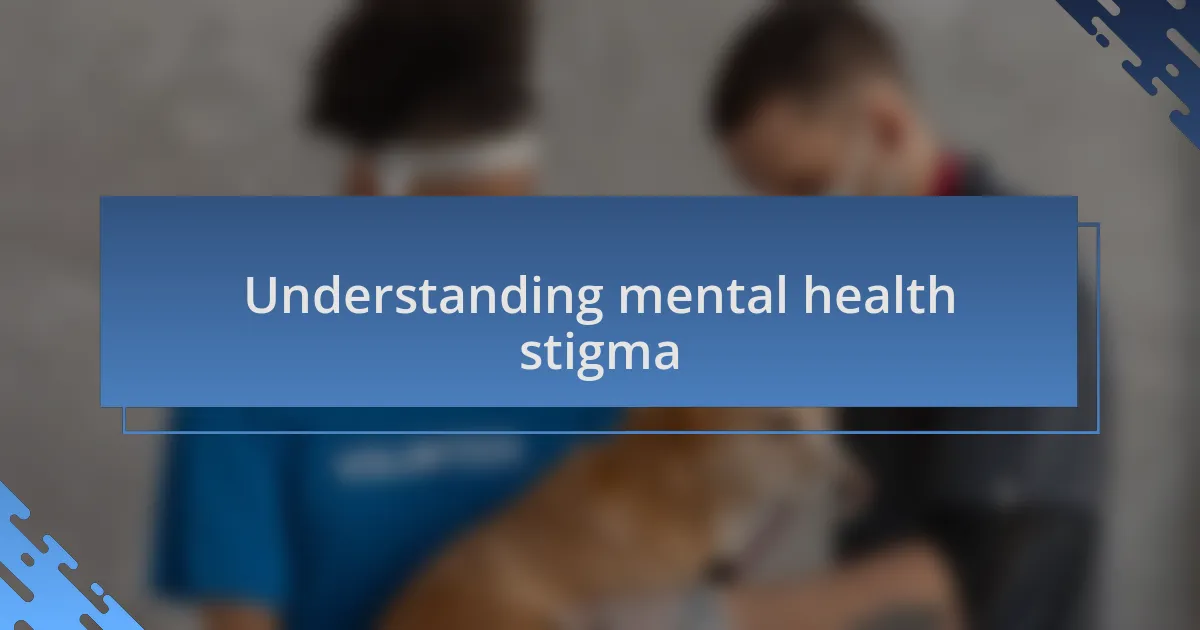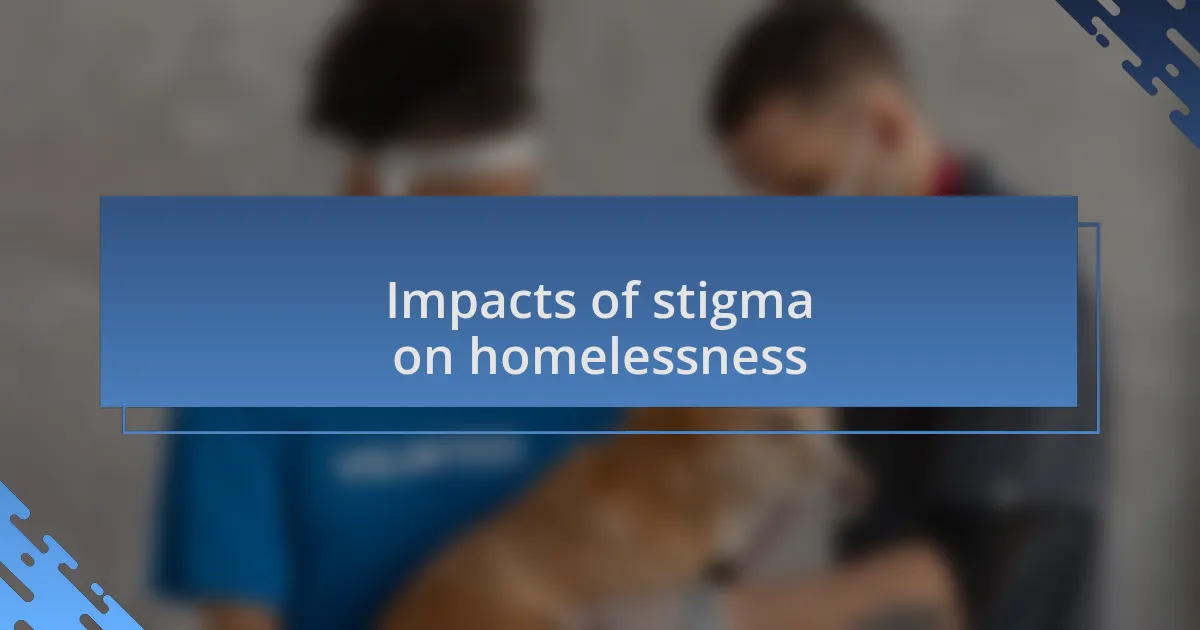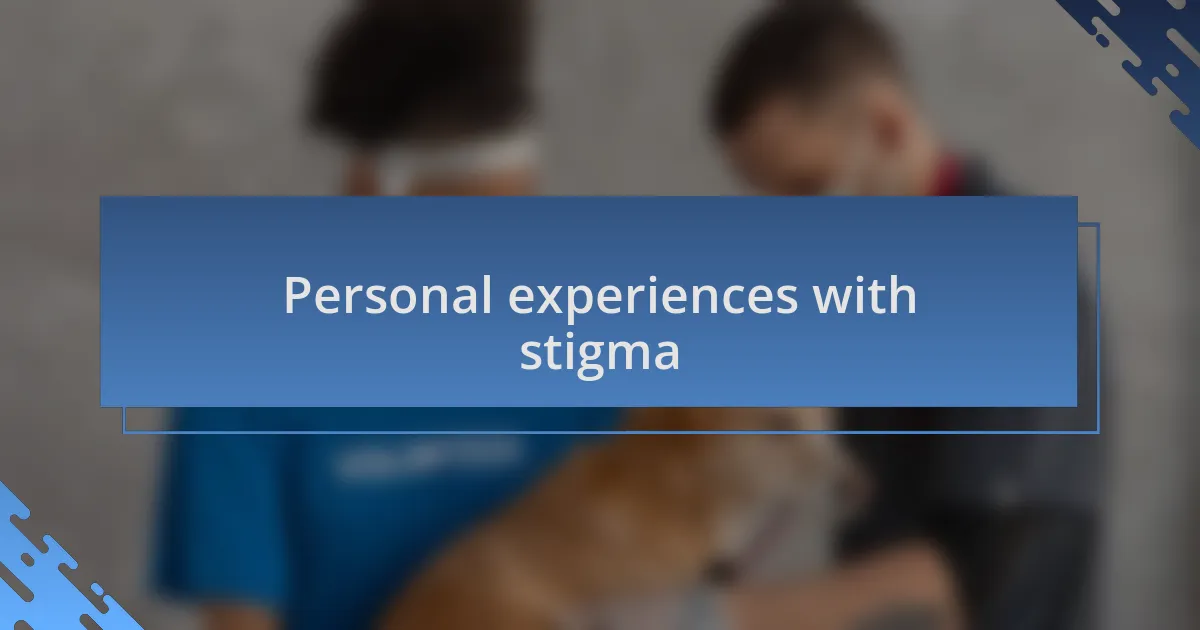Key takeaways:
- Mental health stigma results from misunderstanding and creates barriers that prevent individuals from seeking help, leading to isolation.
- The stigma affects those experiencing homelessness, who face judgment and fear engaging with mental health services.
- Personal stories can foster empathy and understanding, breaking down stigma through open conversations.
- Creating a stigma-free community involves promoting kindness and open discussions about mental health, enhancing support networks.

Understanding mental health stigma
Mental health stigma often stems from a lack of understanding and awareness about mental health issues. I remember a time when I volunteered at a shelter and overheard someone say, “Why can’t they just pull themselves together?” It struck me how easily people dismiss what they don’t comprehend, reinforcing the barriers those suffering from mental health challenges face daily.
When we talk about stigma, we must consider its impact beyond just words. It creates an invisible prison for many individuals. Imagine struggling silently with anxiety or depression, only to feel shame for what you’re experiencing. It’s disheartening. I’ve seen firsthand how this mindset can prevent individuals from seeking help, leaving them to suffer in isolation.
The question we need to ask ourselves is: how can we create a more supportive environment? Sharing stories can be immensely powerful. By opening up about my experiences and encouraging others to do the same, I’ve witnessed how vulnerability can break down walls and foster understanding. We need to focus on empathy, transforming the conversation around mental health into one of acceptance rather than judgment.

Impacts of stigma on homelessness
The stigma surrounding mental health profoundly shapes the experiences of those experiencing homelessness. I recall meeting a man at the shelter who shared how his mental illness had turned him into a target for others’ judgment. He said, “People see me in the street and think I’m just lazy, but they don’t know my battle.” It’s heartbreaking to see how this stigma can define someone’s identity, pushing them further away from acceptance and support.
Stigmatization often leads to a lack of access to crucial resources. In my time working with individuals experiencing homelessness, I observed how fear of being judged can stop someone from reaching out for help. One woman I met was hesitant to engage with mental health services despite her obvious struggles. “What if they don’t believe me? What if they label me?” she pondered. This resistance is a testament to how deeply stigma can entrench itself, effectively locking people in a cycle of despair.
Additionally, the social disconnect that arises from mental health stigma perpetuates a feeling of isolation among the homeless. I remember chatting with a group in a shelter, and they expressed feeling invisible, as if society had written them off due to their struggles. One person said it best: “It’s like people see clothes before they see me.” This lack of recognition not only stifles their voices but also inhibits opportunities for healing and reintegration into society.

Personal experiences with stigma
Engaging with individuals facing stigma in mental health has always left a profound impact on me. I recall a young woman who, despite her intelligence and ambition, refused to share her struggles with anxiety. She feared that revealing her truth would make others see her as “less than” or incapable. It makes me wonder: how many potential friendships and opportunities are lost because of this fear?
During another encounter, I spoke with a veteran who attributed his struggles with PTSD to public perception; he felt that admitting his condition would mean being labeled as weak. His voice trembled as he recounted experiences of being dismissed or labeled during outreach efforts. This experience resonated with me, highlighting how stigma not only silences voices but also reinforces painful barriers to seeking help.
Sometimes, I find myself reflecting on the moments when a simple conversation could have changed someone’s day. There was a man at a community event who opened up about the shame he felt around his bipolar disorder. He mentioned, “I just wish people would understand that this is part of my story, not my whole life.” This constant battle for recognition is unsettling and reinforces the urgent need for compassion and understanding in addressing mental health.

Building a stigma-free community
Creating a stigma-free community is crucial for fostering understanding and acceptance. I recall a community workshop where we encouraged people to share their experiences openly. One participant spoke about how sharing his journey with depression allowed him to connect with others. It struck me: what if everyone had a safe space to express their feelings without fear of judgment?
In my experience, empathy plays a significant role in breaking down stigma. I once attended a support group where a member shared how kindness from others had a profound impact on her healing journey. It made me realize that every act of compassion sends ripples through the community, encouraging others to feel safe in seeking help. I often wonder how many lives could be changed if we all took a moment to listen and understand.
Building an environment where mental health is openly discussed enhances mutual support among individuals. I’ve seen the power of simply asking, “How are you doing today?” This small gesture can open doors to deeper conversations and dismantle misconceptions. Each interaction has the potential to educate and create connections, ultimately leading us toward a more supportive world for everyone facing mental health challenges.